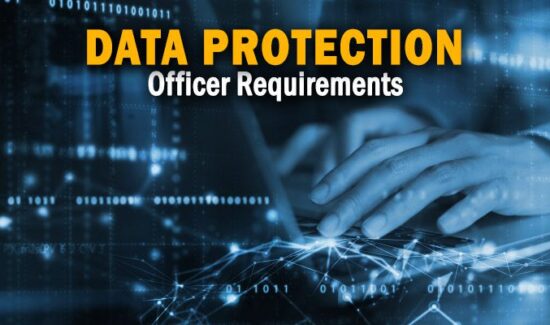7 Essential Data Privacy Officer Responsibilities to Know


Solutions Review editors created this short resource highlighting common data privacy officer responsibilities you need to know.
In an era where data breaches and privacy concerns abound, organizations must prioritize the protection of sensitive information. To ensure compliance with data protection regulations and maintain the trust of customers, many companies appoint a Data Privacy Officer (DPO) to oversee data privacy practices and enforce privacy policies. In this article, we will delve into the top responsibilities of a Data Privacy Officer and how they play a vital role in safeguarding data privacy in the digital age.
Data Privacy Officer Responsibilities
Developing and Implementing Privacy Policies and Procedures
One of the primary responsibilities of a Data Privacy Officer is the development and implementation of privacy policies and procedures. They analyze applicable data protection laws and regulations such as the General Data Protection Regulation (GDPR) and create comprehensive privacy frameworks that align with organizational objectives. The DPO ensures that privacy policies are communicated effectively to all stakeholders, providing clear guidelines on data handling, storage, access, and data subject rights.
Conducting Privacy Impact Assessments (PIAs)
Data Privacy Officers are tasked with conducting Privacy Impact Assessments (PIAs) to identify and assess privacy risks associated with new or existing data processing activities. PIAs involve systematically evaluating the impact of data processing on individual privacy rights and determining the necessary measures to mitigate risks. The DPO works closely with relevant departments to ensure privacy concerns are addressed, and appropriate safeguards are implemented.
Monitoring Regulatory Compliance
Data Privacy Officers have a crucial role in ensuring organizational compliance with relevant data protection laws and regulations. They monitor changes in privacy legislation, assess their impact on the organization, and ensure necessary adjustments are made to maintain compliance. The DPO conducts regular privacy audits, reviews data protection practices, and provides guidance to ensure adherence to regulatory requirements. They collaborate with legal teams to navigate complex legal frameworks and mitigate potential risks.
Managing Data Subject Requests
As the primary point of contact for data subjects, the Data Privacy Officer handles data subject requests regarding access, rectification, erasure, and restriction of personal data processing. They establish efficient processes for managing these requests, ensuring timely responses and proper documentation. The DPO educates employees on data subject rights and facilitates internal coordination to address requests effectively.
Providing Privacy Training and Awareness
Data Privacy Officers are responsible for promoting a culture of privacy within the organization. They develop and deliver privacy training programs to educate employees on data protection principles, best practices, and legal requirements. By raising awareness about privacy risks, the DPO ensures that employees understand their responsibilities and are equipped to handle personal data appropriately. Regular training sessions, awareness campaigns, and communication initiatives foster a privacy-conscious culture across the organization.
Acting as a Data Protection Liaison
Data Privacy Officers serve as a point of contact between the organization, regulatory authorities, and data subjects. They facilitate communication with data protection authorities, respond to inquiries, and collaborate on data protection investigations. The DPO acts as a trusted advisor, providing expert guidance on privacy matters, and acts as an internal advocate for data protection initiatives.
Conducting Privacy Reviews and Impact Analysis
To ensure continuous improvement in data privacy practices, Data Privacy Officers conduct regular privacy reviews and impact analyses. They assess the effectiveness of implemented privacy measures, review data protection incidents, and identify areas for enhancement. The DPO collaborates with IT teams and stakeholders to implement privacy by design principles and embed privacy considerations throughout the organization’s processes and systems.
Final Thoughts
In the face of increasing data privacy concerns, organizations must have a dedicated Data Privacy Officer who assumes the responsibility of safeguarding sensitive information, ensuring regulatory compliance, and promoting a privacy-centric culture. Through developing and implementing privacy policies, conducting privacy impact assessments, monitoring regulatory compliance, managing data subject requests, providing privacy training, acting as a liaison between stakeholders, and conducting privacy reviews and impact analysis, Data Privacy Officers play a vital role in protecting data privacy in the digital age.
By fulfilling these responsibilities, Data Privacy Officers contribute to building trust with customers, enhancing the organization’s reputation, and mitigating the risk of data breaches and regulatory penalties. They are instrumental in establishing and maintaining a robust data privacy framework that aligns with legal requirements and best practices.
Organizations should empower their Data Privacy Officers with the necessary authority, resources, and support to carry out their responsibilities effectively. Collaboration with other departments, such as IT, legal, and human resources, is essential to ensure comprehensive data protection across the organization.
Additionally, Data Privacy Officers should stay up-to-date with the evolving landscape of data protection laws, regulations, and industry trends. Continuous professional development, participation in relevant training programs, and engagement with privacy networks and forums are crucial for staying informed and adapting to emerging challenges.
The role of a Data Privacy Officer is pivotal in maintaining data privacy and ensuring compliance with data protection regulations. Their responsibilities encompass developing privacy policies, conducting privacy impact assessments, monitoring regulatory compliance, managing data subject requests, providing privacy training, acting as a liaison, and conducting privacy reviews. By embracing the expertise and guidance of a Data Privacy Officer, organizations can establish a strong data privacy framework, instill trust in their customers, and navigate the complex landscape of data protection in the digital age successfully.

























